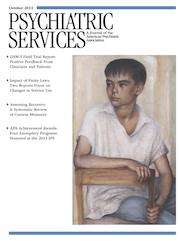Community Mental Health Provider Modifications to Cognitive Therapy: Implications for Sustainability
Abstract
Objective
This study identified modifications to an evidence-based psychosocial treatment (cognitive therapy) within a community mental health system after clinicians had received intensive training and consultation.
Methods
A coding system, consisting of four types of contextual modifications, 12 types of content-related modifications, seven levels at which modifications can occur, and a code for changes to training or evaluation processes, was applied to data from interviews with 27 clinicians who treat adult consumers within a mental health system.
Results
Nine of 12 content modifications were endorsed, and four (tailoring, integration into other therapeutic approaches, loosening structure, and drift) accounted for 65% of all modifications identified. Contextual modifications were rarely endorsed by clinicians in this sample. Modifications typically occurred at the client or clinician level.
Conclusions
Clinicians in community mental health settings made several modifications to an evidence-based practice (EBP), often in an effort to improve the fit of the intervention to the client’s needs or to the clinician’s therapeutic style. These findings have implications for implementation and sustainability of EBPs in community settings, client-level outcomes, and training and consultation.



